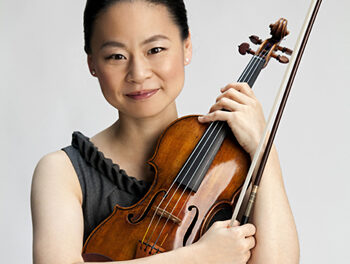Scenes from Fairyland: Music of Robert & Clara Schumann. Jonathan Bagg, viola, with Jane Hawkins, piano, & Donald L. Oehler, clarinet: Robert Schumann: Märchenbilder (Scenes from Fairyland), Op. 113 (for viola & piano); Phantasiestücke (Fantasy Pieces), Op. 73 (originally for clarinet & piano); Adagio and Allegro, Op. 70 (originally for horn & piano); & Märchenerzählungen (Fairy Tales) (for clarinet, viola & piano), Op. 132; & Clara Schumann: Three Romances, Op. 22 (originally for violin & piano). Centaur CDC 2581 (60:18). http://www.centaurrecords.com/
This is a stunning recording of chamber music by the Schumanns – both of them – recorded in Baldwin Auditorium in May 2000. It features three well-known Triangle-based artists who are at home on music platforms around the world. The engineering was by Dwight Robinett, who is among the best there is in a highly subjective, technical field – it helps that he, too, is a first-class musician.
Aside from the three short pieces by Clara Schumann, the music will be familiar to many music lovers, although two of the scores are given in versions that are not all that common. The program opens with a glowing reading of Robert Schumann’s Märchenbilder (Scenes from Fairyland). This was composed for viola and piano, and Bagg and Hawkins give it their all. The viola sound is far richer than usual, which results from noticeably close miking of a superior instrument played by a superior artist. (When I played the CD for the first time, my other half asked, “Who’s the cellist?”) The concluding Robert Schumann work, too, is given with the instruments the composer intended. UNC clarinetist Donald L. Oehler joins his friends from Duke for Schumann’s other great fairyland piece, Märchenerzählungen (Fairy Tales), and together they achieve new levels of excellence in music that many collectors will know intimately. The other two works by Robert Schumann are refreshing in these versions for viola and piano, and the string instrument indeed sheds new light on the music. The Phantasiestücke (Fantasy Pieces) generally turn up on clarinet recitals, but the viola’s richer texture suits the music well; we don’t know how Oehler feels about a violist playing “his” music. The Adagio and Allegro, originally for horn and piano (and recorded by great horn players from Dennis Brain to present-day virtuosi), sounds like a different piece but it does not suffer in the transition, so compelling is the playing from both participants. Clara Schumann’s Romanzen may be the CD’s greatest novelty, especially in this viola-for-violin edition, but the music is eye-opening in several respects, not least of which is the fact that she, too, was a great composer – perhaps Robert’s equal, in many respects.
The erudite notes are by Bagg, who places the works in admirable context. The scores span only five years, from 1849-53, but for Robert Schumann this period was tantamount to an entire lifetime. There is considerable variety in the music, and the CD, which lasts an hour, seems to fly by, thanks to the outstanding performances and recorded sound. Bagg himself prepared the transcriptions of the Fantasy Pieces (Op. 73) and the Romances (Op. 22). This is apparently the first recording of Clara Schumann’s Romanzen in a version for viola and piano. There have been several other recordings of the Adagio and Allegro in viola-for-horn editions.
One of the delights of the Ciompi Quartet, of which Bagg is the violist, is that its members routinely reach beyond the string quartet literature to enrich themselves and their fans with other works, in other forms. This admirable CD is a fine example of the dedication of Bagg – and Hawkins, and Oehler – to chamber music in general. Bravo!
Readers seeking a single CD containing all of Schumann’s music for winds and piano – which includes Opp. 70, 73 and 132, presented here, plus the Andante and Variations, Op. 46, for two pianos, two cellos and horn, and RS’s own 3 Romanzen, Op. 84, for oboe and piano – should seek a copy of Elysium GRK 709, issued in 1996, which features artists of the New York Philharmonic, including oboist Joseph Robinson, originally of Lenoir, NC.











